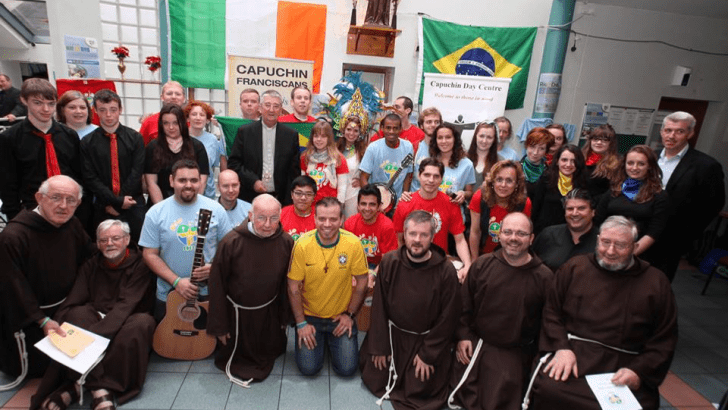Who are the Capuchins?
As Franciscans we are part of a larger family of Catholic friars, sisters and dedicated laypeople founded by St.’s Francis and Clare of Assisi in the 1200’s.
The Capuchins came about when in the 1500’s a group of those friars decided to seek a more radical following of the Gospel according to the original spirit of St. Francis. Becoming known for their distinctive hooded habit, rough cord and bare feet, they chose a life based on contemplative prayer, gospel poverty lived in simple brotherhood, care for the poor and respect for all creation.
We still choose that life today. Could you?
The Capuchins in Ireland:
Since our arrival in 1616 we have served the Irish people during some of the most difficult times in their history. To this day the Irish Capuchins are working as “brothers of the people” by living the good news of the Gospel, reaching out to those on the margins who are in need and by extending the gift of peace to one and all. Today we are present in Dublin, Cork, Kilkenny, Carlow and Donegal, with missions in Zambia, South Africa and South Korea.
Any famous Capuchins I would know?
Perhaps the most famous of our saintly brothers is St. Pio of Pietrelcina in Italy. Padre Pio as he was known became renowned for the many miracles and healings that took place through his prayers and for the hospital he founded for the relief of the sick and poor. He was the first priest to receive the Stigmata, (the visible wounds of Christ’s passion), which he bore for 50 years as a witness to Christ’s love for all of us. Many Irish people still seek his prayers and intercession with the Lord.
As well as St. Pio we have been gifted with many saintly and good brothers down through the years. In Ireland the most famous of these was the “Apostle of Temperance” Fr. Theobald Mathew, who did so much for the relief of the poor. His statue can be seen in both Cork and Dublin city centre.
What work do you do?
While according to the vision of St. Francis our primary work is the simple living out of Gospel brotherhood together we also have many and varied apostolates. Preaching, teaching, chaplaincies to hospitals and hospices, parish work, working with young people, leading prayer groups, ministry to immigrants, online ministry, guiding prayer and retreats and working with the homeless are all part of our Capuchin way of reaching out to our brothers and sisters and building the Kingdom with them.
What’s your prayer life like?
Our day, like our life as friars, begins and ends with prayer.
Two periods of silent meditation, the Divine Office, the Rosary, Lectio Divina and time in adoration are always part of the prayer schedule of the friary, the crowning moment of which is the celebration of the Mass together each day. It is there we meet our Eucharistic Lord and from there that we draw the grace and help necessary for our life as brothers and our ministry to the people. It was said of St. Francis that he did not so much pray as become prayer. That is what every friar aspires to, while being invited and supported to journey ever more deeply into the way of prayer by the fraternity.
Regular times of retreat are also encouraged and made available to all the brothers.
You’re all “brothers” but some of you say Mass, how does that work?
The Capuchins returned to the original vision of St. Francis that the Order would be a “fraternity” a group of brothers living as equals and sharing Gospel life together. Francis, while ordained a Deacon, was never a priest himself. While many of the friars are ordained priests all the friars are equal by profession of the three vows we take to become Capuchins; namely Chastity, Poverty and Obedience. It is this profession that makes you a Capuchin. After that you may feel called to priesthood or to non-ordained ministry. This will be discerned with the community during formation.
What is Formation?
Formation is that period of time spent training as a friar and “discerning” or seeking out as to whether this way of life is for you or not. During this time you will have the experience of living and working with the friars and growing in commitment to the Capuchin Franciscan way while being guided by brothers specially trained to help you make your decision. From Postulancy, (the first stage of formation) to taking perpetual vows usually takes about 8 years.
Making Contact…
A vocation is a mysterious thing! It needs to be discerned carefully and with an open heart. If any of the above has caught your interest or even just your curiosity take some time to read over it, to pray, and research a bit more. You can find out all about the Irish Capuchins at www.capuchinfranciscans.ie and then get in touch by dropping an email to Br Richard on capuchinvocation@gmail.com
Whatever else may come of that first step you can be sure you will meet a brother.


 Synodality is an ancient practice among religions.
Synodality is an ancient practice among religions. 